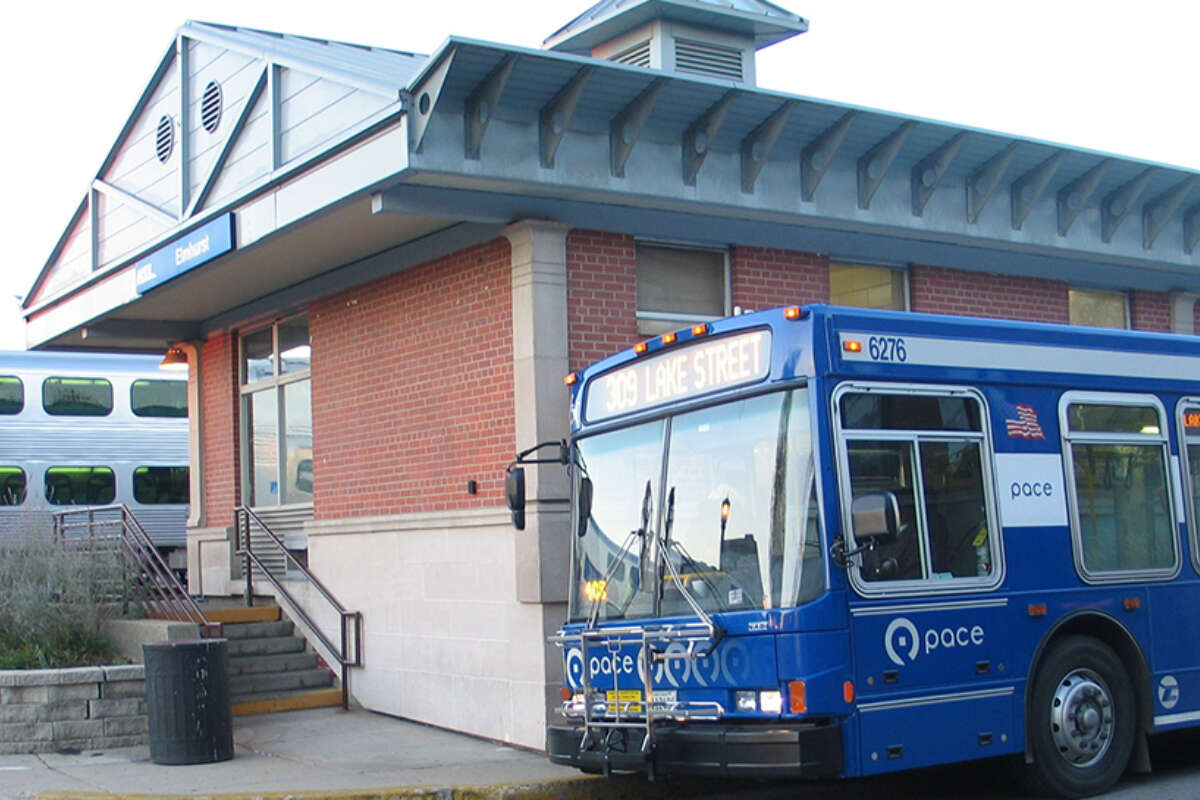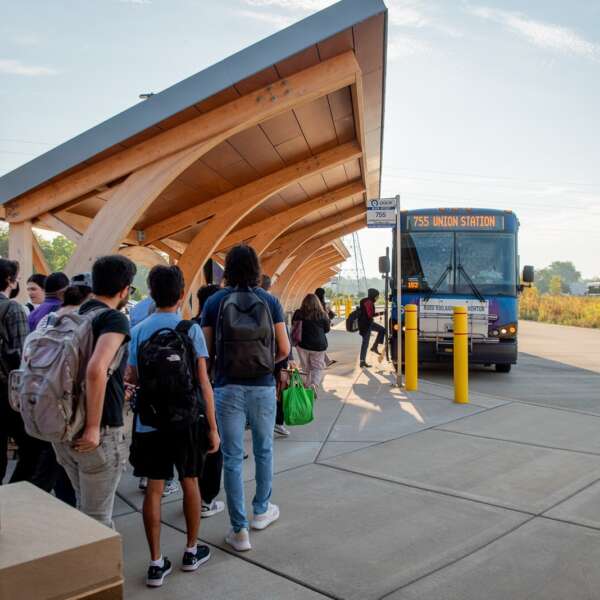
The Regional Transportation Authority is beginning its next five-year regional transit strategic plan during a time of dynamic social and economic transformation. Regions all over the world are experiencing an evolution in personal mobility and work. The Chicago region’s transportation system must adapt and, ideally, anticipate change.
Developing a new regional transit strategic plan is a long journey with many steps before the expected adoption of a plan in January 2023. In August, the process began with a workshop with the RTA Board of Directors where staff engaged members representing the city of Chicago and the six counties of Northeastern Illinois served by the RTA by asking them to prioritize opportunities and challenges in five broad areas: Opportunities for Impact, Transit System Adaptation, Funding Sustainability, Equity, and Engagement. (Watch the full Board meeting on YouTube or read more about the plan and workshop in a staff memo.)
The Board kicked off a 15-month process of gathering input from a wide range of stakeholders by offering feedback on the importance of supporting a strong, financially stable transit system that will serve the region well in the coming years. They also discussed priorities, such as climate and equity that need to be addressed.
Opportunities for impact
To begin the workshop, staff asked, “What is the greatest opportunity for impact right now that the strategic plan process should address?”
Several Board members spoke about climate change and transit’s role in encouraging a greener future. Others said the focus needs to be on strengthening the region’s transportation system, which will help achieve other goals like economic growth.
“Strengthening the region’s broader transportation system is our role and our responsibility, in cooperation with the Service Boards. Strengthening our broader transportation system is in service of everything else,” said Director Alexandra Holt, who represents the City of Chicago. “We can’t really talk about climate change, health and education, or economic growth without strengthening the system and making sure we can provide the best possible options for people in the city and surrounding counties.”
Transit system adaptation
Acknowledging the need for evolution of the system, next staff asked, “What types of transit system changes should be the focus of this process?”
Director Michael Lewis who represents Cook County, brought up the idea of fare integration – creating one card or system that would allow riders to use CTA, Metra, and Pace more seamlessly.
He also said the system needs to be more flexible to future changes in transportation patterns. “We have transit assets, jobs, and opportunities that don’t always line up with one another. “We need to have enough flexibility because what is true today may not be true ten years from now,” Lewis said.
Director J.D. Ross, who represents Will County, said he was concerned about pursuing expansion of the system without considering the needs of transit-dependent populations. “COVID has demonstrated why this is so important. Look at how many critical workers still had to go to their workplace as opposed to those who were able to work from home. We can’t ignore that segment of the market,” Ross said.
Funding sustainability
Invest in Transit, our current regional transit strategic plan adopted in 2018, made the region’s case for pursuing funding to support transit. Since its adoption the region has seen the passage of Rebuild Illinois, the first state capital plan in a decade, but also experienced the dramatic financial impacts of the pandemic on ridership and farebox revenue. To help focus future efforts around funding, staff asked Board members “Which key financial issues should be addressed through this process?”
Several board members expressed concerns about the statutory recovery ratio process where RTA’s operating funding is tied to expected ridership and farebox revenue levels. Board members said it is time to rethink how the transit system measures its success beyond ridership, and how that should be tied to funding.
“Ridership may be down, but we know there is still a critical need,” said Mary Beth Canty, who represents Cook County. “We have to think about how we measure the success of the RTA and Service Boards and then how do we fund that? How do we make the case to the State and get them to realize how important mass transit is?”
While some Board members were excited about the big picture thinking and innovative ideas that could come from a strategic planning process, several mentioned the need to make financially responsible decisions. Director Sarah Pang, who represents the city of Chicago, said that while there is a desire to tackle bigger issues, she knows the Service Boards each have work to do just to maintain the current system.
“There are a lot of things that we would like to accomplish but there is a real boundary here called funding,” said Director Christopher Groven, who represents Kane County. “We have to go through this process and figure out where we are going to spend the resources because they are not limitless.”
Equity
Staff asked, “What are some productive ways for RTA to define, understand, and incorporate equity during this process?” Possibilities presented to the Board for discussion included developing a shared regional equity statement, fostering discussion about equity, establishing goals and performance measures for equity, and more.
“Equity starts with a strong system,” said Director Melvin. “To me, the first thing we should be focused on is a state of good repair to make sure we have a strong system with strong Service Boards.”
Board members also acknowledged previous criticism the RTA has received from civic and advocacy groups that say the agency has not gone far enough to address equity in the past and expressed a desire to make more progress in this area in the future.
How to get engaged in the strategic plan
The final question staff asked for guidance from the Board on was who should be engaged in the regional transit strategic plan process. The Directors were clear that engagement should be robust and ongoing and seek input from a wide audience of stakeholders including riders, elected officials, civic and advocacy groups, employees of the Service Boards, and members of the public.
The RTA cannot plan for the next chapter of transit’s story alone. Throughout the fall the RTA will be conducting outreach and engagement around the topics described above through a variety of modes including guest speakers at future board meetings, guest blog posts on Connections, small stakeholder workshops with leaders at other regional transportation agencies, transit advocates, business leaders, representatives of the disability community, and more. There will also be an opportunity for riders to give their input though a public survey, a virtual event, and social media.
Subscribe to the Regional Transit Update newsletter to stay informed and learn about upcoming opportunities to get involved.
Subscribe to our Newsletter

 For the third year in a row, regional transit ridership was up by double-digits in 2024
For the third year in a row, regional transit ridership was up by double-digits in 2024
 RTA is seeking $1.5 billion in annual operating funding. What would that mean for your commute?
RTA is seeking $1.5 billion in annual operating funding. What would that mean for your commute?
 RTA proposes reforms to increase efficiency, transparency, and accountability across transit system
RTA proposes reforms to increase efficiency, transparency, and accountability across transit system
 What Chicago can learn from Philadelphia as the transit fiscal cliff approaches
What Chicago can learn from Philadelphia as the transit fiscal cliff approaches
 2024 recap: RTA brings 8 Transit Station Activations throughout region as part of pilot program
2024 recap: RTA brings 8 Transit Station Activations throughout region as part of pilot program
 Village of La Grange adopts comprehensive plan calling for more density near transit
Village of La Grange adopts comprehensive plan calling for more density near transit